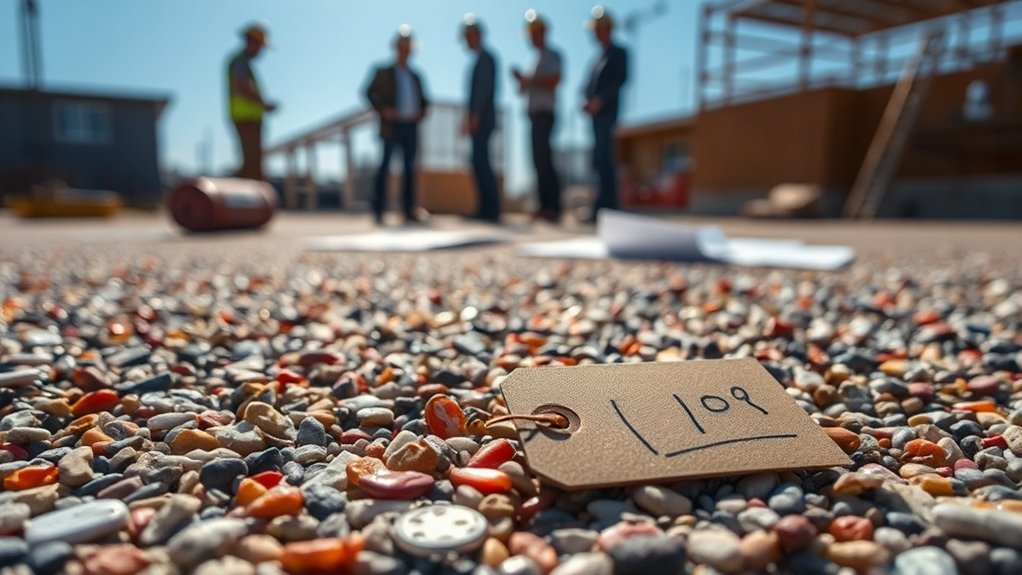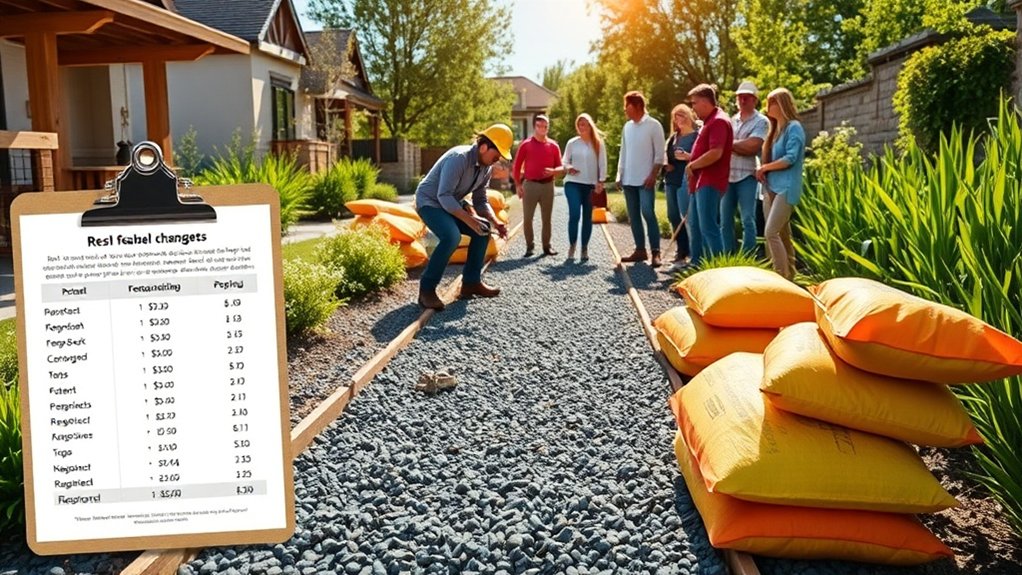Regulatory changes, such as new compliance rules and adjustments to tariffs, have significantly increased production costs for resin-bound gravel. This situation calls for a reassessment of sourcing strategies, which could lead to higher prices for consumers. As suppliers pivot towards domestic sources to counter tariff effects, competition may diminish, further affecting pricing. Moreover, the growing preference for eco-friendly materials is shaping market trends. It’s important to understand how these changes can impact your project planning and material selections.
Key Takeaways
Regulatory changes, such as mandatory REACH training, are raising operational costs for resin installers, which in turn affects the pricing of resin-bound gravel projects. Compliance with new hazardous chemical regulations is pushing up production costs, resulting in higher prices for resin-bound gravel materials.
Moreover, SUDS regulations require permeable surfaces, which can increase installation costs as eco-friendly materials become a priority. Fluctuations in demand for sustainable options also impact pricing in the resin-bound gravel market.
Additionally, quarterly assessments and compliance checks add extra expenses, contributing to the rising costs of resin-bound gravel installations.
Overview of Recent Regulatory Changes

As regulatory frameworks change, it’s important to be aware of the recent updates that impact resin-bound gravel pricing.
From August 24, 2023, all resin installers must undergo mandatory REACH training to ensure compliance when handling hazardous chemicals. This requirement can drive up installation costs, as non-compliance could lead to legal penalties and potential exclusion from the market.
Moreover, the introduction of Sustainable Urban Drainage Systems (SUDS) regulations means that new driveways over 5m² must have permeable surfaces. This makes resin-bound gravel a suitable and compliant choice.
Adhering to industry standards set by organisations like FeRFA and BBA also enhances quality and reliability in projects. Additionally, BBA approval ensures that materials meet rigorous testing for durability, which can further justify pricing increases.
It’s worth noting that the ever-evolving nature of these regulations necessitates ongoing training and certification, which can further influence pricing as installers invest in compliance measures.
Effects of Tariff Adjustments on Material Costs

Tariff adjustments have significantly increased production costs, affecting your profits in resin-bound gravel projects. With rising material prices, it may be necessary to rethink your sourcing strategies to stay profitable while maintaining quality. Exploring alternative suppliers and local options can help ease the financial burden from these tariff-driven price increases. Additionally, understanding the average total cost of resin-bound gravel projects can aid in making informed financial decisions. Properly installed driveways can last 15-25 years, which makes investing in high-quality materials crucial for long-term savings.
Increased Production Expenses
Due to recent tariff changes, UK producers are facing rising production costs, mainly from increased duties on imported resin binders. This has significantly pushed up raw material prices, affecting the overall cost of resin-bound gravel. Consequently, many producers are adopting effective cost management strategies, such as revising budgets and adjusting supply chains. Moreover, to adapt to the market, some are looking into forward contracting for resin imports and strengthening partnerships with local production facilities. While these adjustments come with their own set of challenges, the industry is taking a proactive stance to stabilise prices and remain competitive. The higher upfront costs may also be impacted by these rising production expenses, further complicating pricing structures for consumers. Focusing on local production may help reduce dependence on imports and enhance the resilience of the supply chain.
Sourcing Strategy Revisions
Producers are revising their sourcing strategies to tackle rising costs from recent tariff changes. Increased tariffs on imported resin and aggregates have significantly raised procurement expenses, creating sourcing challenges.
Many buyers are now turning to domestic suppliers to avoid these tariffs, although these suppliers might charge higher prices due to less competition. This shift is changing supplier relationships, as regional suppliers with lower tariff exposure gain more negotiating power.
To manage costs, producers are forming strategic alliances and diversifying their material sources, looking for alternatives that are less affected by tariffs.
Furthermore, comprehensive supplier risk assessments now consider geopolitical stability, ensuring that procurement strategies remain strong amidst tariff fluctuations.
Supply Chain Responses to Regulatory Changes

As regulatory changes affect the pricing of resin-bound gravel, supply chains are adapting by diversifying sources and forming strategic partnerships. Companies are increasingly using forward contracting to manage costs amid rising tariffs and compliance costs. Collaborations with local production hubs also strengthen resilience and ensure a reliable supply of materials. Furthermore, adherence to Sustainable Urban Drainage Systems (SuDS) guidelines is becoming a crucial factor in maintaining compliance and managing operational costs in the industry.
Diversification of Supply Sources
As companies navigate recent regulatory changes, many are opting for geographic diversification of their resin and aggregate suppliers. This strategy helps to reduce supply risk by sourcing resin binders from alternative regional producers, lessening dependence on major suppliers based in Europe and North America.
By expanding gravel and aggregate quarry networks into nearby areas, businesses can lower shipping costs and avoid delays caused by stricter environmental regulations.
Investing in emerging markets such as Asia-Pacific and Africa also enhances vendor diversity, aligning with local resource availability.
These strategies not only build resilience against regulatory shifts but also comply with green industrial policies, creating a more sustainable and robust supply chain for resin-bound gravel production.
Forward Contracting Strategies
In the ever-changing landscape of regulations, forward contracting strategies have become essential for companies in the resin-bound gravel sector. These strategies bolster supply chain resilience and offer vital tools for managing risks effectively.
By including flexible contract terms, businesses can better adapt to regulatory shifts. Key aspects of these strategies include:
- Enhanced force majeure clauses to address unexpected events
- Customised contracts for various supplier categories
- Integration of technology to simplify contract management
Implementing these strategies ensures price stability and helps mitigate risks linked to fluctuating regulations.
Regional Production Collaborations
Regional production collaborations are increasingly seen as a strategic response to the challenges of changing regulations in the resin-bound gravel industry. By forming local partnerships, manufacturers can lessen their reliance on unpredictable global resin markets, helping to stabilise costs.
For example, following Chinese restrictions on quartz sand exports, European producers have turned to local aggregates and formed resin supply partnerships. These collaborations not only improve the availability of raw materials but also foster resin innovation through joint research and development efforts.
Additionally, coordinating inventory management among regional players boosts resilience against supply disruptions. Ultimately, these partnerships are crucial for adapting to stricter regulations while ensuring efficiency and sustainability in resin-bound gravel production.
Domestic Production Growth in the Resin Industry

As the demand for lightweight and durable materials increases, the domestic resin industry in the UK is witnessing substantial growth, particularly in key sectors such as packaging, automotive, and consumer goods.
This trend is supported by several factors:
- Innovations in resin that improve product performance and sustainability.
- Sustainability initiatives that encourage recycling and environmentally friendly manufacturing.
- Enhanced production capacity, with UK output expected to reach 34 billion kilograms by September 2024.
With global projections for the synthetic resin market anticipated to grow to £490 billion by 2025, the UK stands to gain from a shift towards domestic supply chains.
The adoption of advanced technologies and a strong commitment to sustainability aren’t only fulfilling current demand but also setting the stage for future industry growth.
Pricing Dynamics Influenced by Material Selection

When choosing materials for resin-bound gravel projects, it’s vital to grasp the pricing dynamics to manage costs effectively. The type of resin selected significantly influences material expenses.
For example, aliphatic resins, while more expensive, offer durability and UV resistance, which can reduce long-term maintenance costs. On the other hand, standard epoxy or polyurethane resins may have a lower initial price but can lead to higher overall costs due to quicker wear and tear.
The choice of aggregate also affects pricing. Local materials are generally more affordable, whereas specialty aggregates can significantly increase costs, sometimes doubling or tripling them.
Investing in high-quality resins and aggregates can enhance both durability and appearance, but this comes with steeper upfront costs.
Ultimately, it’s essential to find the right balance between quality and cost to ensure the success of your project.
Market Trends in Resin-Bound Gravel

The resin-bound gravel market is poised for considerable growth, with estimates predicting it will reach around £1.1 billion by 2030.
This trend is largely driven by a growing preference for sustainable materials and high-performance options.
The competitive landscape is moderately concentrated, making it crucial to understand these dynamics as you explore pricing and market opportunities in this evolving sector.
Growth Projections and Factors
With urbanisation and infrastructure development driving demand, the resin-bound gravel market is set for notable growth in the coming years. Key factors influencing this expansion include:
- Increased demand for sustainable, eco-friendly building materials.
- Technological advancements improving resin formulations for enhanced durability and quicker curing times.
- A rising need for permeable paving solutions in urban water management.
Valued at £844 million in 2025, the global resin-bound aggregates market is projected to grow significantly, with the permeable surfacing segment alone expected to reach £2.81 billion by 2033.
This market growth aligns with current construction trends, while innovations increasingly focus on bio-based and recycled materials.
Although challenges such as raw material price fluctuations may arise, the overall outlook remains positive, driven by heightened infrastructure investments.
Consumer Preferences and Trends
How are consumer preferences influencing the resin-bound gravel market?
Today, sustainability is at the forefront of your choices, with a rising demand for eco-friendly materials. Many of you’re opting for bio-based resins and recycled aggregates, appreciating permeable systems that help manage stormwater runoff.
Aesthetic appeal is also significant; you favour personalised colours and finishes that enhance your home’s look. The desire for unique designs and seamless surfaces reflects a trend towards modern elegance.
Additionally, low-maintenance and durable options that can withstand various weather conditions are high on your priority list.
As awareness grows around improved resin formulations that offer better performance, your expectations regarding longevity and quality continue to rise, further shaping the resin-bound gravel market in the UK.
Competitive Market Landscape
As urbanisation accelerates and infrastructure investments increase, the resin-bound gravel market is evolving quickly.
Key trends shaping this market include:
- Competitive differentiation through innovations in resin formulations that improve performance and sustainability.
- A move towards sustainable innovations, driven by regulatory pressures and consumer demand for eco-friendly solutions.
- Greater collaboration between manufacturers and installation specialists to provide integrated system solutions.
With the global resin-bound aggregates market set for significant growth, companies that prioritise advanced technologies and customisation are likely to capture a larger share.
North America and Europe currently lead the market, but emerging economies offer substantial growth opportunities, especially as they embrace these permeable and durable paving options.
Long-Term Implications of Tariff Increases

The recent tariff increases on imported resin binders and decorative aggregates have raised production costs, but their long-term effects are poised to significantly alter the resin-bound gravel market.
Manufacturers are likely to pivot towards domestic and regional production, which could bolster market resilience against future disruptions. As local producers ramp up operations and innovate, we can expect a more competitive environment that diminishes reliance on imports. This shift may help stabilise pricing structures, even though we’re seeing initial cost increases.
Furthermore, the focus on local sourcing can improve supply chain reliability, helping to offset the negative impacts of regulatory changes.
While challenges are still present, enhancing domestic capabilities is likely to fortify the market’s long-term sustainability.
Consumer Considerations in Project Planning

When planning a resin-bound gravel project, it’s crucial to assess the site and surface conditions carefully to ensure a successful installation. A thorough site evaluation can significantly impact your budget and project timeline.
Here are some key steps to consider:
- Carry out a site survey to check for stability, drainage, and current surface conditions.
- Measure dimensions accurately, allowing for a 5-15% material buffer to accommodate any unevenness.
- Identify and address any necessary repairs to cracks or weak points before installation.
The Role of Regional Partnerships in Supply Stability

Regional partnerships are crucial for maintaining supply stability in resin-bound gravel projects. They improve access to quality materials and streamline logistics.
By forming local sourcing agreements and working with suppliers such as Derby Aggregates, you can diversify your material sources, reducing risks from geopolitical issues and fluctuating tariffs.
These partnerships often enable bulk purchasing, which lowers per-unit costs and stabilises pricing. Local distribution hubs also mean materials are readily available, cutting down on project delays.
Moreover, strategic regional collaborations can help reduce logistics costs and lower carbon footprints, positively impacting final pricing.
In essence, regional partnerships build a resilient supply chain that ensures consistent product availability, keeping your projects on track and within budget.
Strategies for Adapting to Regulatory Changes

As regulatory changes in the resin-bound gravel industry occur, adapting your strategies is crucial for compliance and project efficiency.
Here are some key strategies to consider:
- Mandatory Training: Ensure all installers complete REACH diisocyanate training to handle hazardous materials safely.
- Sustainable Urban Drainage Systems (SUDS) Compliance: Design permeable structures that meet water management regulations, improving drainage and promoting sustainability.
- Regular Audits: Carry out quarterly assessments to update installation practices and ensure alignment with evolving standards.
Frequently Asked Questions
How Do Tariffs Affect Resin-Bound Gravel Installation Timelines?
Tariff delays can significantly affect installation timelines by raising material costs and complicating sourcing. For instance, if the price of resin rises due to tariffs, you might need to adjust your budget or even seek alternative suppliers, which could prolong the project. Be prepared for potential changes in your schedule and costs as you navigate these challenges.
What Are the Environmental Impacts of Resin-Bound Gravel Materials?
Resin-bound gravel materials provide environmental advantages through efficient water management and lower pollution levels. By sourcing materials responsibly, such as using recycled aggregates, you can minimise your environmental footprint. This approach not only promotes durability but also helps reduce waste in construction practices. For instance, using recycled materials in driveways or paths not only lessens landfill waste but also creates a long-lasting surface. Overall, choosing resin-bound gravel can contribute positively to both your project and the environment.
Are There Alternative Materials to Resin-Bound Gravel?
Yes, you can explore permeable paving systems and concrete alternatives like block paving, rubber surfaces, or Gravel-Lok. These options offer different aesthetics, permeability, and durability while addressing some environmental concerns linked to resin-bound gravel.
How Can Homeowners Ensure Quality in Resin-Bound Gravel Installations?
To ensure quality in resin-bound gravel installations, follow these key steps. First, stick to established installation standards. Second, use materials that are BBA-certified for reliability. Lastly, schedule regular audits to assess the work done. By taking these steps, you’ll significantly improve the durability and performance of your installation. For example, choosing a reputable installer who follows these guidelines can save you time and money in the long run.
What Is the Typical Lifespan of Resin-Bound Driveways?
Resin-bound driveways usually last between 15 to 25 years, influenced by how well they are installed and maintained. Using high-quality materials and keeping up with regular maintenance can significantly extend their lifespan, making them a robust option for homeowners.
Conclusion
Navigating the changing landscape of resin-bound gravel pricing requires a solid understanding of regulatory shifts. These regulations can significantly impact material costs and supply chains, which in turn affects your project budget and timelines. For example, if new environmental standards are introduced, suppliers may need to adjust their practices, leading to increased prices. As you plan your projects, it’s crucial to consider how these factors interplay. By staying informed and adapting your strategies, you can manage costs effectively and ensure your projects remain on track, even amid ongoing industry changes.
